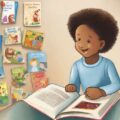Those working in child development and family studies have a unique opportunity to positively impact children’s lives. Let’s explore some of the most meaningful ways to do so.
Teaching Children: Shaping Young Minds
As an early childhood educator or teacher, your patience, guidance, and care helps children thrive. By planning engaging lessons catered to different learning styles and developing activities focused on social-emotional growth, you nurture children to reach their potential.
Researching Childhood Development: Advancing Knowledge
Researchers devote themselves to better understanding the cognitive, physical, and socioemotional milestones of childhood. By publishing studies on development disorders or family dynamics, you provide insights that inform best practices in parenting, education, and policymaking.
Counseling Families: Supporting Relationships
Family therapists and social workers empower healthy relationships. With empathy and wisdom cultivated from your own experiences, you create safe spaces for families to share struggles, identify growth opportunities, and reconnect with hope.
Frequently Asked Questions
What are the most meaningful careers in child development?
The most meaningful child development careers involve directly working with children and families – as teachers, pediatricians, therapists, and researchers devoted to nurturing healthy growth at every stage of childhood.
What jobs allow you to positively impact children’s lives?
Jobs that allow you to positively impact children include early childhood educators, school counselors, child life specialists, occupational therapists, speech pathologists, pediatric nurses, and child psychologists among others.
How can you nurture children’s healthy socioemotional development?
You can nurture healthy emotional and social growth in children by cultivating safe, caring environments at home and school focused on building self-esteem, modeling respectful communication, teaching emotional regulation tactics, and ensuring all children feel seen and valued.
What are some important milestones in early childhood development?
Some major cognitive, emotional, and physical milestones in early childhood include babbling, crawling, walking, self-feeding, pretend play, mirroring facial expressions, bonding with caregivers, developing fine motor skills, understanding object permanence, and acquiring language.
Why is studying child development and families so important?
Studying child development and family relationships is crucial for informing impactful early childhood education programs, parenting techniques, therapies for developmental disorders, and family-oriented policies – all which profoundly shape children’s lifelong health and wellbeing.









